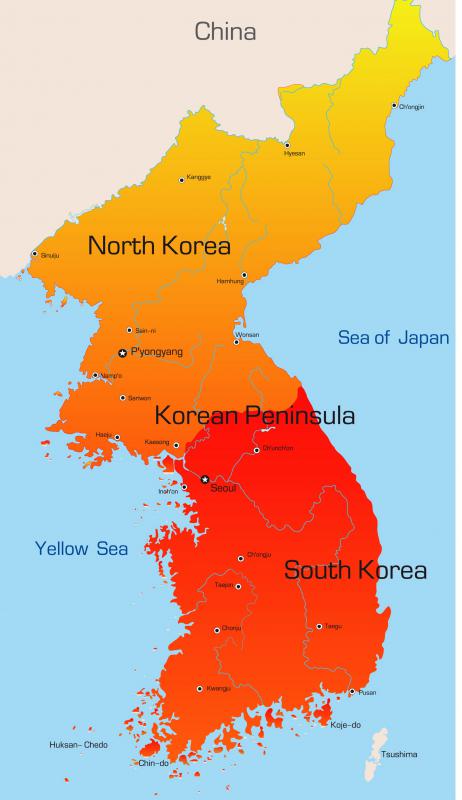At WiseGEEK, we're committed to delivering accurate, trustworthy information. Our expert-authored content is rigorously fact-checked and sourced from credible authorities. Discover how we uphold the highest standards in providing you with reliable knowledge.
What Are the Benefits of Persimmons?
There are many benefits of persimmons. These fruits are low in fat and calories but rich in various vitamins and nutrients, many of which help prevent and fight against disease. Persimmons are also a convenient fruit that can be eaten raw or cooked in a variety of dishes.
This fruit is primarily grown in Japan, China, and Korea, and persimmons have only gained popularity in North America and Europe in recent decades. Astringent persimmons are the most common variety and are red and heart-shaped or acorn-shaped. Non-astringent persimmons are lighter in color and shaped like a tomato.

Both types offer many of the same nutritional benefits, but non-astringent persimmons contain fewer tannins. These polyphenols are what cause the bitter, astringent taste common to persimmons and are, therefore, more prevalent in astringent varieties. Tannins alone offer many health benefits. They bind proteins found in the mouth, reducing the effectiveness of bacteria. Tannins also help prevent cellular damage, contributing to a reduction in the risk of infection, heart disease, and cancer.

Large amounts of vitamins A and C are among the other health benefits of persimmons. Vitamin A has anti-aging properties and helps protect against vision loss, while vitamin C helps prevent infection and reduce inflammation. Several B-complex vitamins, which aid metabolic function, are also present in persimmons.
This fruit also contains high levels of the minerals copper, potassium, manganese, and phosphorus. Copper contributes to the production of red blood cells. Potassium helps regulate the heart and kidneys. Both manganese and phosphorus are important minerals involved in the formation and maintenance of bones, and phosphorus helps to regulate digestion, as well. Persimmons are also high in fiber, another digestive aid.
More benefits of persimmons include the anti-cancer, anti-infection, and anti-hemorrhagic properties offered by specific compounds, acids, and antioxidants found in the fruit's flesh. Betulinic acid and shibol are both anti-tumor compounds that help prevent the formation of cancerous tumors. The carotenoids lycopene, zeaxanthin, and cryptoxanthin are also present in persimmons and may have anti-cancer properties, as well, but the connection between these carotenoids and the prevention of cancer are not yet confirmed by the United States Food and Drug Administration.
Persimmon flesh also contains antioxidants called catechins and gallocatechins. These antioxidants are commonly thought to have anti-infective and anti-inflammatory properties. Catechins are also an anti-hemorrhagic agent, meaning that they help stop bleeding by sealing damaged blood vessels.
Many individuals peel the skin before consuming this fruit, but some benefits of persimmons come from the skin instead of the flesh. The skin contains proanthocyanidins, a type of phytochemical with anti-aging properties. Proanthocyanidins protect the body's cells from incurring oxidative damage, thereby reducing cell damage associated with aging.
Along with their health benefits, versatility and convenience are also benefits of persimmons. When ripe, persimmons are a sweet snack suitable for dieters, since they only contain approximately 70 calories for every 100 grams of fruit. If the fruit is just barely ripe, it has a firm, crisp texture and can be eaten in slices. After fully ripening for a few days, the texture becomes softer, and the flesh can be scooped out and eaten in spoonfuls.
Persimmons can also be dried or cooked. Dried persimmons are eaten plain or added to cookies, cakes, salads, and granola. Alternatively, an individual can cook fresh persimmons down to make into baked pudding, jellies, pies, curries, and more.
AS FEATURED ON:
AS FEATURED ON:












Discussion Comments
I have a theory that persimmon may also help fight anxiety and depression. Actually any fruit or vegetable that has so many vitamins and antioxidants will help fight depression to some degree. We actually need vitamins, such as B vitamins, to keep our stress levels down. High stress levels cause over-production of stress related hormones, which over time can lead to anxiety and depression.
My mom was in the emergency room a few days ago with high blood pressure. It went up to 20 which is too high. It took about six hours in the ER to get her blood pressure to return to normal. The next day, my mom said she has a craving for persimmon and asked me to buy some. She has been eating several of the fruit every day since the incident.
I had heard a few years ago from a doctor that we tend to crave foods that our bodies have a need for. I wasn't too sure about it then but after reading this article, I'm convinced of it. My mom obviously craved the fruit because of its cardiovascular benefits. Moreover, high blood pressure has the risk of causing strokes and damage and bleeding in blood vessels. And persimmon is healing for these too. It's quite amazing.
I've always loved persimmons but I had no idea that it has so many benefits. I guessed that it is a fruit rich in vitamin C as fruits with this color usually are. But I was not aware of the other vitamins, minerals and antioxidants. It's wonderful.
I'm only able to find them at Asian groceries around here but I plan on buying them more often now that I know how healthy and beneficial they are. Thank you for this article, it's very informative and straight to the point.
Post your comments